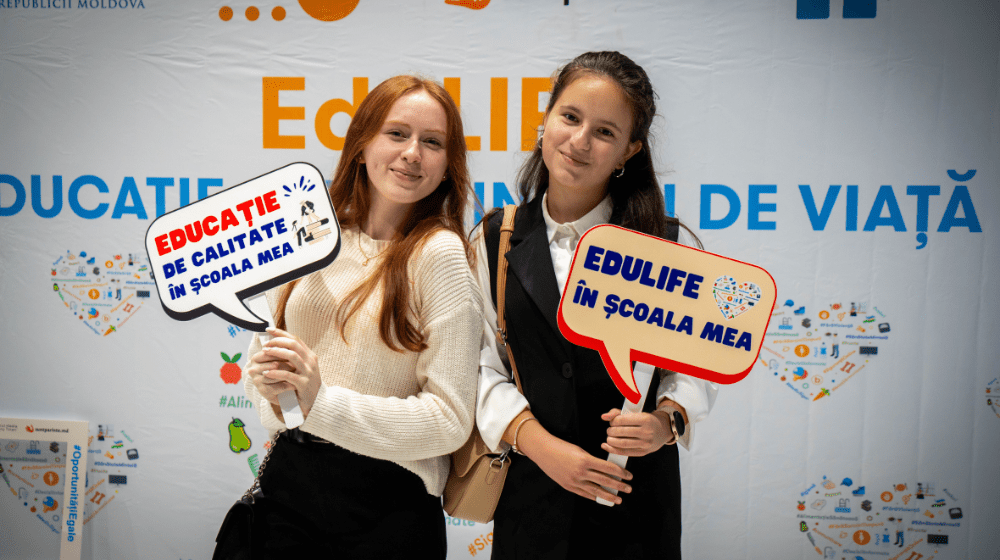In September, over 130 general education institutions across the country will be equipped with menstrual pad dispensers, providing free menstrual pads to students throughout the school year. Free access to menstrual hygiene products in schools will significantly reduce absenteeism rates among girls, help break the taboo surrounding this topic, and reduce cases of bullying.
This initiative is part of the EduLIFE School Program, implemented by the UN Population Fund (UNFPA) in the Republic of Moldova, the Ministry of Education and Research, the Youth Media Center and Suntparinte.md. The program includes several key elements: upgrading and equipping learning-friendly classrooms, and the offices of school psychologist and nurse; providing access to health education and non-formal activities; and ensuring dispensers with free menstrual pads for students.
The EduLIFE School model was piloted in 2023 in four educational institutions: “Mihail Sadoveanu” Theoretical High School in Hîncești Municipality; “Metropolitan Nestor Vornicescu” Theoretical High School in Lozova village, Strășeni district; “Ion Creangă” Secondary School in Ermoclia village, Ștefan Vodă district; and “Ion Creangă” Theoretical High School in Căușeni city.
The results of the Pilot Program were presented at the National Conference on Menstrual Health and Hygiene in Schools entitled “I don't have to go home anymore. We have menstrual pads in my school”, which brought together over 100 specialists in Chisinau, including Moldovan and Romanian MPs, ambassadors, representatives of line ministries, UN agencies, district education departments, school managers, teachers, and students.
“The topic of menstrual health and hygiene is a logical continuation of the previous campaign on students' access to indoor toilets, water and hygiene products in school. I am glad that the Pilot Program has helped to reduce school dropout rates and to no longer consider some topics about normal physiological processes taboo. The next step is to scale up these good experiences and adjust the funding formula to cover all costs. We stand by UNFPA in this process,” Dan Perciun, the Minister of Education and Research, said.
Karina Nersesyan, the UNFPA Representative in the Republic of Moldova, stated that the presence of menstrual hygiene products in schools helps prevent bullying, reduces anxiety and increases girls' self-esteem:
“Nowadays, menstruation can start even at eight years, an early age for girls, who are often not informed about this physiological process. It is important to talk openly about these topics so that no girl feels ashamed or afraid. Menstrual hygiene and access to menstrual pads is a fundamental rights of every girl, and realising this right means realising their right to education and health. I call on you to mobilize our efforts so that this pilot initiative reaches all schools in Moldova”.
“Seven years - that’s the average duration of a woman's menstrual period throughout her life. It's a very costly period. We have previously discussed with specialists in the field and considered potential solutions, such as capping mark-ups, reducing import duties and VAT on menstrual hygiene products. We will analyze the Customs Code and other regulatory documents to identify how we can introduce provisions on menstrual hygiene products”, said Marina Morozova, MP, Deputy Chair of the Social Protection, Health and Family Committee of the Moldovan Parliament.
A survey of 558 students from the four pilot schools revealed that just three months after the installation of menstrual pad dispensers, the percentage of students who missed school at least once during their menstrual period dropped more than fourfold - from 55.2% to 12.5%.
Oana-Silvia Țoiu, a Member of the Romanian Parliament and the initiator of the law introducing free menstrual pads in Romanian schools, attended the conference and stated that the challenges and experiences of the Republic of Moldova are similar to those across the Prut River, where efforts are currently underway to make access to menstrual hygiene products a standard in all schools:
“Initially, we consulted with the social welfare departments, teachers and school managers. For many students, this was a taboo subject, rarely discussed at school or at home. We also involved the girls and boys from the schools in developing the project concept - where to install the dispenser, who would be responsible for refilling them, which products to choose. Some students became Project Ambassadors, keeping us informed about the situation in their schools. We also created a network of local councillors who submitted resolutions to their councils, advocating for local budgets to allocate resources for menstrual pads. Our goal is to implement this initiative nationwide”.
“It's undoubtedly a problem affecting girls across the country, especially those from vulnerable families. A classmate of mine had to go home because she didn't have any menstrual pads. Before having dispensers in the school, menstruation was a taboo topic, so she didn't dare to ask for help or talk about it. Several girls at my school have been in similar situations”, said Anastasia Bragarenco, a ninth grader at “Ion Creangă” Secondary School in Ermoclia village, Stefan Voda district.
The assessment also found that 56% of the girls interviewed felt safer at school after the dispensers were installed. Additionally, a third of the girls reported that boys had stopped making period jokes and had become more respectful.
“Girls and boys need to be educated at school about the changes related to puberty and how to avoid risky situations during adolescence. We cannot leave this responsibility solely to parents, as there are families where these topics are avoided or parents are abroad”, said Ion Văleanu, a 11th-grade student at “Mihail Sadoveanu” Theoretical High School in Hîncești Municipality.
We would like to mention that, at the beginning of 2024, menstrual pad dispensers were also installed in Youth-Friendly Health Centers Network and in 24 youth centers across the country.


